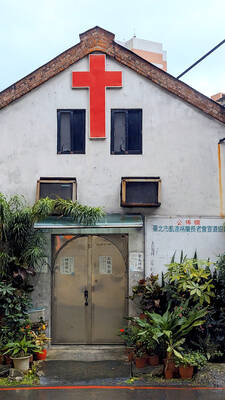California Grill opened its second location in Taipei’s East District (東區) last summer, but recently expanded its previously tiny storefront. The restaurant, which is right behind the Sogo on Dunhua South Road (敦化南路), is plainly decorated but roomy and, like California Grill’s Yongkang Street (永康街) location, features a flat-screen television that plays TV shows of extreme sports on constant rotation. The footage might give you ideas for how to burn off the calories you’ll consume in the form of California Grill’s hamburgers. The restaurant was founded by two Americans in 2007 and features patties made with 100 percent USDA beef. Vegetarians and health-conscious diners will also find plenty of options. All burgers are served with a side of salad or thick-cut fries.
A standout on California Grill’s menu is the Mofo burger (NT$195), which is a beef patty or teriyaki chicken breast topped with bacon, American cheddar cheese, BBQ sauce and garlic mayo on a white bread bun (a tofu version is available for NT$175). The smorgasbord of flavors, from the savory bacon to the sharp cheddar cheese, is satisfying. Another particularly decadent option is the western bacon burger (NT$205), beef or teriyaki chicken topped with strips of bacon, BBQ sauce and cheddar cheese with a heap of crispy, fresh onion rings on top for some extra crunch.
California Grill has three burgers on its menu made exclusively with chicken breast. The best is the very flavorful teriyaki chicken breast (NT$155), the worst for your arteries is the breaded fried chicken sandwich (NT$165) and the most original is the hidden valley (NT$195), which is topped with red onion, sprouts, pepper jack cheese, bacon, is smothered in ranch dressing and comes in a whole wheat bun. Despite the very piquant ingredients, however, the hidden valley sandwich was bland compared to the restaurant’s burgers. The pepper jack cheese and red onions were the dominant flavors and overwhelmed the other ingredients, including the juicy chicken breast.
If you can’t decide what to order, consider the sliders platter (NT$250), which includes four mini-burgers (beef, chicken, salmon and tofu) and a salad or fries. The slice of Canadian freshwater salmon fillet was plump and delicious (it comes as a regular-sized sandwich for NT$200), while the tofu, marinated in a sesame, soy and ginger sauce, was also surprisingly satisfying, even though its texture is softer and less toothsome than the meat-filled sandwiches.
California Grill offers three salads. The Green Goddess and Napa Valley (both NT$160) are topped with hot, freshly grilled chicken breast and are hearty enough for meals by themselves. The Valley Girl is the house salad that is served as a side with hamburgers and is NT$140 when ordered as a dish.
The restaurant’s weekday lunch specials (NT$159 each from 11:30am to 3pm) include a Napa Valley, Green Goddess salad or two classic beef, teriyaki chicken breast, tofu or breaded fried chicken sliders with French fries or salad. Each set includes iced tea (soda for NT$15 more).

Following the rollercoaster ride of 2025, next year is already shaping up to be dramatic. The ongoing constitutional crises and the nine-in-one local elections are already dominating the landscape. The constitutional crises are the ones to lose sleep over. Though much business is still being conducted, crucial items such as next year’s budget, civil servant pensions and the proposed eight-year NT$1.25 trillion (approx US$40 billion) special defense budget are still being contested. There are, however, two glimmers of hope. One is that the legally contested move by five of the eight grand justices on the Constitutional Court’s ad hoc move

Stepping off the busy through-road at Yongan Market Station, lights flashing, horns honking, I turn down a small side street and into the warm embrace of my favorite hole-in-the-wall gem, the Hoi An Banh Mi shop (越南會安麵包), red flags and yellow lanterns waving outside. “Little sister, we were wondering where you’ve been, we haven’t seen you in ages!” the owners call out with a smile. It’s been seven days. The restaurant is run by Huang Jin-chuan (黃錦泉), who is married to a local, and her little sister Eva, who helps out on weekends, having also moved to New Taipei

The Directorate-General of Budget, Accounting and Statistics (DGBAS) told legislators last week that because the Chinese Nationalist Party (KMT) and Taiwan People’s Party (TPP) are continuing to block next year’s budget from passing, the nation could lose 1.5 percent of its GDP growth next year. According to the DGBAS report, officials presented to the legislature, the 2026 budget proposal includes NT$299.2 billion in funding for new projects and funding increases for various government functions. This funding only becomes available when the legislature approves it. The DGBAS estimates that every NT$10 billion in government money not spent shaves 0.05 percent off

Dec. 29 to Jan. 4 Like the Taoist Baode Temple (保德宮) featured in last week’s column, there’s little at first glance to suggest that Taipei’s Independence Presbyterian Church in Xinbeitou (自立長老會新北投教會) has Indigenous roots. One hint is a small sign on the facade reading “Ketagalan Presbyterian Mission Association” — Ketagalan being an collective term for the Pingpu (plains Indigenous) groups who once inhabited much of northern Taiwan. Inside, a display on the back wall introduces the congregation’s founder Pan Shui-tu (潘水土), a member of the Pingpu settlement of Kipatauw, and provides information about the Ketagalan and their early involvement with Christianity. Most